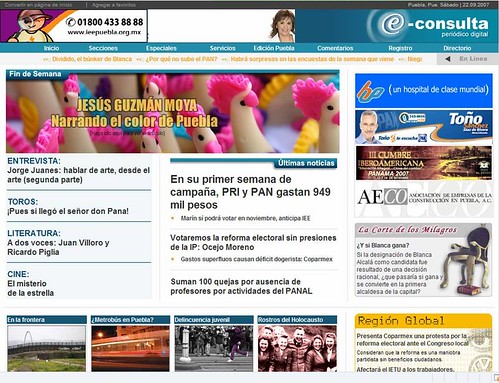
Entrevista en e-consulta (Interview at e-consulta), originally uploaded by chuchogm.
Gracias Erika Chávez y Rolando Lino.
Si quieres ver la entrevista:
Entrevista en e-consulta
La vida hormonal de un blogger.

Comparto con ustedes la emoción que tengo por "México Mágico".
Tiempo Iberoamericano
展示会情報 (2007.4.22)
最新情報 (2007.4.22)
▲Topページに戻る
メキシコ人写真家ヘスス・グスマン・モジャ
『メキシコマジック』
2007. 5. 11 fri ~ 5.17 thr ※入場無料
EL TALLER : Open 12:00~22:00
Sancho Panza : Open 11:30~23:00
メキシコ大使館、外務省協力により、メキシコ人写真家ヘスス・グスマン・モジャによる写真展の開催が決定。5月11日から17日のあいだ、新しくリニューアルする『エル・タジェール』、そしてカフェレストラン『サンチョ・パンサ』での並行展示。
食事、住宅、舞踊などメキシコの都市、プエブラの人々の生活シーンを活写した作品を披露。色彩に富む作品の数々は私たちの目に焼きつけられることでしょ
う。さらに、12日の月例イベント『パチャンガ』ではサンチョ・パンサとのコラボレーションを企画。そして13日には、El Tallerにて、写真家自身による座談会を開催。作品について語ってくれます。
■■■ 座談会 ■■■
5月13日(日) Start 18:00 @ EL TALLER ※参加無料
後援:在日メキシコ大使館 / 外務省
Photography Exhibition:México Mágico by Mexican Photographer Jesús Guzmán-Moya
At Tiempo Iberoamericano, thanks to the support of the Mexican Embassy and the Secretary of Foreign Relations, we will have the pleasure of enjoying a photography exhibit by renown Mexican photographer Jesús Guzmán-Moya at El Taller and Sancho Panza. His exhibition will feature the city of Puebla and will be shown from May 11-17.
The photographs show the daily life of the people of Puebla, its cuisine, architecture, folkloric dances – all bursting with color to capture our attention. Along with the exhibition will be two important activities. One will be at Pachanga on the 12th, where the photographer will present a slide show on the cuisine of Puebla while we can feast on some of the more popular dishes of Mexico. And on the 13th, at El Taller, there will be a discussion about the works at the gallery. If you like art, and especially photography, don’t miss this great exhibition and accompanying presentations.
Exposición fotográfica México Mágico por el fotógrafo mexicano Jesús Guzmán-Moya:
En Tiempo Iberoamericano y gracias al apoyo de la Embajada de México y la Secretaría de Relaciones Exteriores, vamos a poder disfrutar de la obra fotográfica de Jesús Guzmán-Moya, un renombrado fotógrafo mexicano, que expondrá en la galería El Taller y también en Sancho Panza sus trabajos sobre la ciudad de Puebla. Su exposición la podremos disfrutar todos del 11 al 17 de mayo.
Sus fotografías presentan la vida cotidiana de la gente de Puebla, su gastronomía, la arquitectura de sus casas, sus danzas folklóricas y, todo ello, con un gran colorido que va a quedarse grabado en nuestras retinas. Además va a haber dos actos importantes: uno en la “pachanga” del día 12, donde el fotógrafo nos presentará unas fotos sobre la gastronomía de la ciudad de Puebla, mediante power-point, a la vez que podremos degustar algunas de las recetas más conocidas de México. Y el otro será el día 13, en El Taller, donde dará una charla sobre su obra, mientras contemplamos in situ las fotografías de las que nos habla.
Si te gusta el arte y sobre todo la fotografía, no te puedes perder esta magnífica muestra fotográfica.
Recordando que hace un año después de que mi mamá termino el tratamiento con quimioterapia y pasamos la Semana Santa en este maravilloso lugar.
David sé que no lo estas pasando muy bien, pero ya sabes que tienes todo mi apoyo, un abrazo para los dos, esperando que todo salga muy bien.
Inicio con quimioterapia hace unas horas...
Son nombres de danzas que imitan los bailes europeos del siglo XIX. Cuando fue la invasión francesa en 1862, las tropas, a la hora de descansar, tocaban y bailaban, la música y danzas que traían consigo. El pueblo mexicano los observaba y los imitó para ridiculizarlos, sin saber que estaban introduciendo un elemento cultural nuevo a su música y bailes nacionales. No fueron iguales, ni en vestidos, ni en pasos, ni en música, solo fueron imitaciones, pero sirvieron para desarrollar una nueva creatividad. Las cuadrillas bailan en las calles recorriéndolas durante esta fiesta.
These are names of dances that imitate European dances of the 19th Century. During the French Intervention in 1862, the troops, as the rested, would play and dance the music they brought with them. The Mexican people would watch, then imitate to ridicule them, without realizing that they were introducing a new cultural element to the national music and dance. They were not the same in costume, steps, nor music, they were only imitations, but they served as the foundation of a new creativity. They dance the cuadrillas in the streets during this fiesta.
¿Te portaste bien? Hoy 5 de enero en la noche llegan los "Reyes Magos" con muchos regalos para ti.